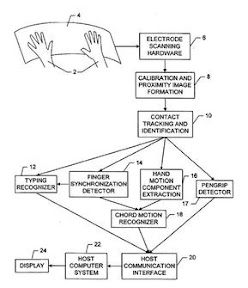Last Mile Online had an article today worth considering and to an extent, consistent with my earlier posts on Broadband Policy in the U.S.
From my archives:
Call for a National Broadband PolicySee this article:
Broadband Legislation Could Boost Economy by $134 Billion Annually
New Social Networking Site
I don't typically use this forum to promote things, but a client of mine has recently launched a very promising and well designed social networking site for people of the Catholic faith.
Go to
http://www.mycatholicvoice.com to participate. It already features thousands of professionally created audio, video and literature entries. Since launch, they are now picking up the user generated content as well. It's a must for those wanting to deepen their Christian faith.
Stats on Social Networks
Statistics on Social Network traffic from TechCrunch
The Global Race Among Social Networks Heats Up. Keep an Eye on Hi5, Friendster, and ImeemIt's becoming a way of life!
The Next Generation of Computer Interfaces
In the news over the last week have been a couple of articles talking about next generation user interfaces with computers. First was a Bill Gates prediction:
Gates sees diminished role for keyboards where in an address at Carnagie Mellon, he stated "People will increasingly interact with computers using speech or touch screens rather than keyboards".
Second have been several articles about
Apple filing an 80 page patent on an interface that would replace the traditional keyboard and mouse combo.

We should anticipate the proliferation of
gesture computing type interfaces, spurred by the interface of the iPhone which gave the public a taste for interface with a high ease-of-use factor. There are several videos out there that demonstrate gesture computing, but take a look at
Jeff Han on TED This gives you a nice view on what's possible today.
I still wonder about the voice model, even though there have been many voice recognition tools available for sometime. I suspect we'll eventually get a hybrid of multi-touch, voice and "virtual keyboard".
All very exciting. I can't wait to get my first "touch" computer!
SMS Messaging a Winner for Presidential Campaigns
In an article on MarketingCharts.com titled
Mobile Advertising Changes Voters’ Attitudes and Behaviors, some astounding results are cited from recent Presidential campaigns on the use of SMS ads to promote their candidate.
The overall impact was considerable, with 28% altering their voting intentions
If you were to get a text message on your phone for a particular candidate, would it:
a. cause you to pay more attention to that candidate?
b. make you more likely to vote for that candidate?
c. turn you off completely?
How would you feel if you got a blast message from a Presidential candidate?
This campaign cycle is displaying some unique uses of mobile technology. Political Consultants will try anything if it gives them an upper hand on their opponents. Expect to see a lot more as we move toward the November elections.
-Andy
More Presidential Candidate Tech Assessments

Since my last post assessing the stances of different candidates regarding broadband, several other bloggers have made assessments. One I thought was quite clever was from
GIZMODO the first on
Democratic Candidates and the second for the
Republican CandidatesI especially liked the "If [candidate] were a gadget, she'd be" sections.
-Andy
Presidential Candidates' positions on Broadband
As promised in an earlier post titled
More Broadband, I've taken a look at the leading presidential candidates and their positions on broadband in America. What I am finding is that the Democratic candidates seem to have a stronger grasp on this issue. Sadly, with the exception of Senator McCain, the Republican candidates say very little about the issue of broadband accessibility, affordability, penetration and speed. The D's are a little light on the details, but all recognize the challenges of rural America, the current 200 kbps standard and the concept of coming back into a position of world leadership in broadband. Some even recognize the benefits to our economy, healthcare and educational systems.
Below are some quotes from the candidates' websites and interviews as well as commentary by me where there are no real quotes to be seen.
- Deploy Next-Generation Broadband: "Barack Obama believes that America should lead the world in broadband penetration and Internet access. He believes we can get true broadband to every community in America through a combination of reform of the Universal Service Fund, better use of the nation's wireless spectrum, promotion of next-generation facilities, technologies and applications, and new tax and loan incentives. Full broadband penetration can enhance competition, provide economic growth, and bring significant consumer benefits. Obama has supported Chicago's citywide wireless broadband initiative and believes national policy should support state, local, and public-private partnerships as well as private efforts to make high speed access to the Internet available to all Americans. As a key step to achieving full broadband access, Obama believes the Federal Communications Commission (FCC) should provide an accurate map of broadband availability using a true definition of broadband instead of the current 200 kbs standard and an assessment of obstacles to fuller broadband penetration."
- Hillary Clinton: • The Rural Broadband Initiatives Act. "This legislation will extend and improve access to broadband services in small towns across America. It creates a policy and action framework to ensure that the federal government employs an effective and comprehensive strategy to deploy broadband service and access in the rural areas of the United States. The bill will also establish a Rural Broadband Innovation fund to explore and develop cutting edge broadband delivery technologies to reach underserved rural areas. The Rural Broadband Initiatives Act has been endorsed by the Communications Workers of America."
- Hillary Clinton: Establish a national broadband strategy called Connect America. "Hillary will strengthen tax incentives for extending broadband to underserved areas. She will support state and local broadband initiatives, from new wireless technologies to high-speed fiber optics. And she will change the FCC rules so we that we finally have an accurate, detailed picture of broadband deployment and penetration rates. At present, the FCC data is unreliable because it is based on loose estimates and outdated standards. Hillary will also create a new public private partnership, modeled on the successful ConnectKentucky program which has dramatically improved broadband access. The initiative has stimulated significant private investment and has increased the state’s broadband coverage rate to over 90%."
- Building a Universal, Affordable Internet: "The country that developed the internet is now 16th in the world in broadband penetration. While half of urban and suburban households have broadband, less than a third of rural homes do. John Edwards will set a national broadband policy to help make the Internet more affordable and accessible to all Americans, regardless of where they live or how much money they have. Universal broadband would stimulate job creation and result in up to $500 billion in economic benefits. The starting place is setting a goal of giving all U.S. homes and businesses access to real high-speed internet by 2010. Edwards will establish a national broadband map to identify gaps in availability, price, and speed; create public-private partnerships to promote deployment; require providers not to discriminate against rural and low-income areas and to improve accessibility for people with disabilities; support and expand the e-rate program; encourage local service providers and municipal wireless projects, and use the newly available 700 megahertz spectrum and broadcast television white space to support wireless networks that can connect with all digital devices." [Newsweek, 7/9/07; CWA, 2006; Pew, 2007]
- John McCain: "I believe that we must promote competition and reduce regulation in order to secure lower prices and higher-quality services for consumers and encourage the rapid deployment of new technologies.
I have been a leading advocate in the Senate for seeking market-based solutions to increasing broadband penetration. We should place the federal government in the role of stimulator, rather than regulator, of broadband services, remove state and local barriers to broadband deployment, and facilitate deployment of broadband services to rural and underserved communities."
- Former Massachusetts governor Mitt Romney is another would-be presidential candidate who doesn't seem to have a broadband policy. Nothing good, nothing bad, nothing quotable that the WCA could find to mention. http://findarticles.com/p/articles/mi_m0PJR/is_14_5/ai_n19378999/pg_5
- Mike Huckabee - where I'm partial to the last name, he doesn't have a broadband platform for the future that I can yet see. Searches turn up very little and his website brings up nothing. The only thing I can find is his claim for an increase in e-government during his time as Governor in Arkansas.
In closing, I haven't really made up my mind about who will be the best leader for our country. I'm registered as a Republican, but have concerns about their lack of positions in regards to technology and the future of broadband. If you have some relevant information to add, please let me know.
-Andy

 Since my last post assessing the stances of different candidates regarding broadband, several other bloggers have made assessments. One I thought was quite clever was from GIZMODO the first on Democratic Candidates and the second for the Republican Candidates
Since my last post assessing the stances of different candidates regarding broadband, several other bloggers have made assessments. One I thought was quite clever was from GIZMODO the first on Democratic Candidates and the second for the Republican Candidates